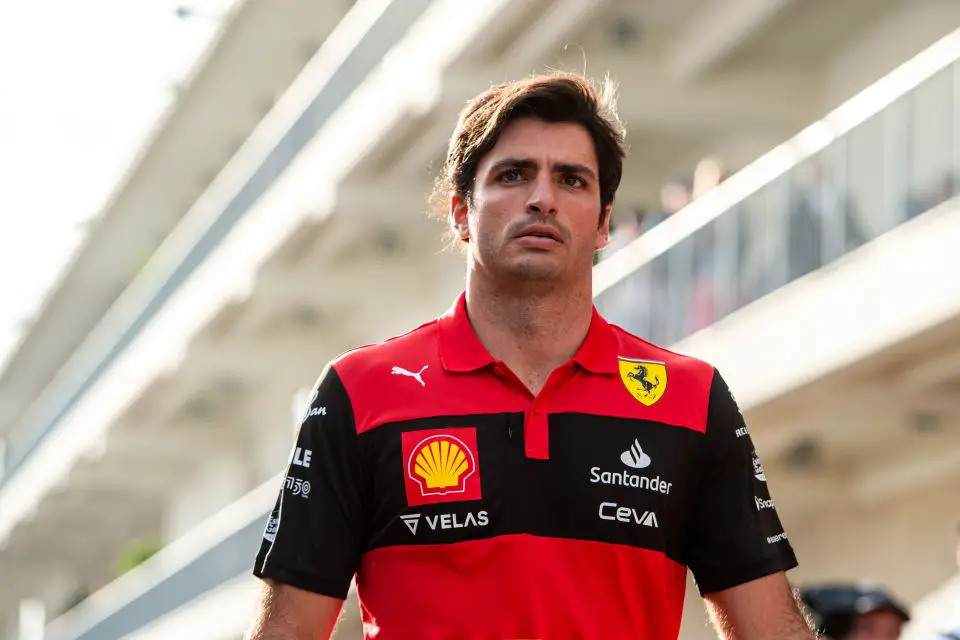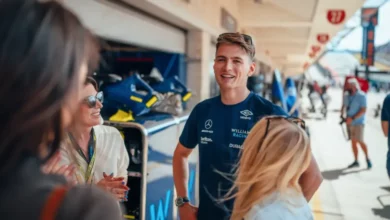F1 News: Sainz’s Disappointment in Las Vegas Over Unexpected Penalty
Carlos Sainz expressed his disappointment with the FIA and the teams for not intervening in his 10-place-grid penalty during the Las Vegas FP1. Despite his lack of fault, Sainz faced a significant setback due to a ruling that he felt let him down in a crucial moment of the sport.
Key Takeaways:
- Unexpected Penalty: Carlos Sainz, after his Ferrari was damaged by a drain cover at high speeds, was penalized with a 10-place grid drop for using a third energy store on his SF-23. This decision was made despite it being no fault of his own.
- Lack of Support: Neither the FIA nor the teams stepped in to support Sainz, causing him to feel abandoned by the sport. Interestingly, commentator David Croft reported that nine teams were in favor of waiving the penalty, but one team opposed it.
- Disappointment and Surprise: Sainz’s frustration was evident in his statement post-qualifying, as he expressed his surprise and disappointment with the sport’s handling of the situation, particularly pointing out the influence of rival teams in the decision-making process.

In a recent turn of events during the Las Vegas FP1, Ferrari driver Carlos Sainz Jr. faced a challenging situation. The Spanish driver was forced to deal with an unexpected 10-place grid penalty, which was imposed after his car suffered significant damage due to a drain cover on the track. Sainz, who had no part in the incident, was compelled to accept this penalty, leading to a surge of disappointment and frustration.
The penalty came as a shock to many, including Sainz himself, who expected a more understanding and flexible approach from the sport’s governing bodies and teams. The Ferrari driver was outspoken about his feelings, stating, “I think it speaks for itself, no? There was clearly a safety issue at the track – that safety issue destroyed my car. My mechanics have to invest five hours in putting together a completely new car and, on top of that, we get a 10-place grid penalty for something that we have nothing to do with.”
This situation highlighted the rigid nature of the sport’s rules, which sometimes fail to accommodate unforeseen circumstances such as this. Sainz’s disappointment was compounded by the lack of support from the other teams, who he felt could have rallied to his defense. As reported by David Croft to Sky Sports, nine out of the ten teams were actually in favor of allowing Sainz to replace the parts without a penalty. However, it was the dissenting vote of one team that ultimately sealed his fate.
Sainz further added, “I’m just simply disappointed. At the same time, not surprised, because there have been many cases this year that I think this sport has proven that it can do things a lot better.” This incident not only impacted Sainz’s position in the qualifying round but also raised questions about the sport’s ability to deal with exceptional circumstances in a fair and just manner.
Moreover, Sainz hinted at the involvement of rival teams in ensuring the penalty was enforced. This aspect of the incident sheds light on the competitive nature of the sport, where teams may prioritize their own interests over a sense of collective fairness. Sainz’s remarks reflect a broader issue within the sport, where rules and rivalries can sometimes overshadow the spirit of competition and fairness.
In conclusion, Carlos Sainz’s experience in Las Vegas serves as a stark reminder of the complexities and challenges that drivers face in Formula 1. His situation underscores the need for a more nuanced approach to the sport’s regulations, one that balances the strict adherence to rules with a fair consideration of unforeseen circumstances.
